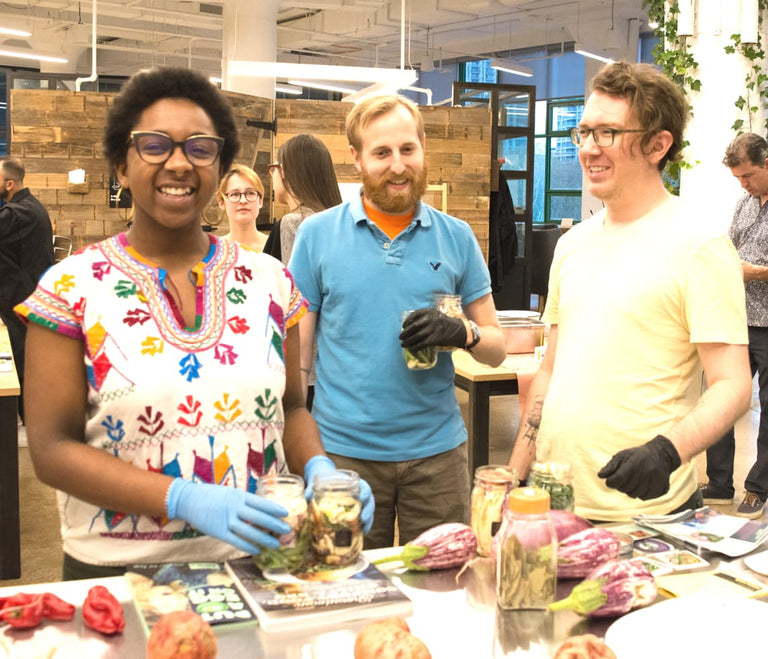Go With Your Gut: an interview with Maria Geyman, ND
On Thursday afternoon, as the winds of the nor’easter rattled the windows of my office and a white flurry of snow covered the streets of Midtown, I was warmed by the voices of Local Roots Creative Lead, Emily Scioscia, and Maria Geyman, Naturopath and Local Roots member. Maria was meant to get on a flight to New York from Portland that day, but due to the storm, she spoke with us from Oregon. The three of us told stories of our experiences that sparked our interest in the topic of gut health, which led us to this interview.
After completing her education at the National University of Natural Medicine in Portland, Geyman attended Remede Naturopathics in New York City, completing her postdoctoral naturopathic medical residency. Now a board-certified naturopathic physician, Maria tends to patience at Juniper in Brooklyn, has given lectures at the Brooklyn Grange and the Natural Gourmet Institute, and serves as adjunct faculty at Ramapo College of New Jersey and Pacific College of Oriental Medicine.
For many of us, the word “gut” has become ubiquitous, but is often misunderstood. I had Maria give her definition:
“The gut usually refers to digestive tract in general. Our track begins at the mouth. The main organs are the stomach–digestive enzymes are made and released there when you start thinking about food.” This is where our conversation began.
What organs does the word “gut” include?
The gut usually refers to digestive tract in general. Most people think of the large and small intestines, but the pancreas, gallbladder, and a few other organs are also included. “Gut” is a word people throw around a lot. Those organs are mainly where it’s taking place.
Can you explain the relationship between our guts and our brains?
There are a few answers to that:
- The Anatomic connection
- The Microbiome
- Neurotransmitters.
One aspect of it is the production of neurotransmitters. Something like 90% of serotonin is produced in the gut, modulating mood. The microbiome refers to the microorganisms that live in the digestive tract. There are different parts of the body that have microbiomes; the micromes in the gut modulate communication between the digestive tract and the nervous system. The third main aspect is the zeaga vagus nerve, a major nerve part of the parasynthetic nervous system. One of these is the cranial nerves.
How does your gut communicate with your brain and why is this an important aspect of understanding health?
I think what happens a lot of times, especially with New Yorkers, is that so many people have anxiety and depression or a certain degree of something that’s not perfect in their lives. A lot of times, especially with anxiety, people have digestive issues—IBS is a common one.hat’s a very simple way that our gut connects with our brain that we don’t think about a lot. When you’re thinking about an approach to anxiety and mood, sometimes it’s good to think about digestion first.
How does what we consume impact our microbiome?
The caveat with all of this stuff is that our bodies are not all exactly the same. Some things that are inflammatory for one person might be fine for another person. The main food group that is helpful for the microbiome is fiber. Foods that are high in fiber include: fruits and vegetables, beans, nuts, and seeds. Those are the main high fiber foods that help most people feed a healthy microbiome.
What are some common symptoms of an unhealthy gut biome?
Irregular digestion, gas and bloating. This also connects to what I was saying earlier about mood. In combination with mood changes, those symptoms can sometimes manifest as skin rashes, bloating, anxiety, depression, irritability, and brain fog.
Does an unhealthy gut lead to a bad immune system?
I don’t know if I would say that, because our immune systems are generally very strong. Your immune system probably isn’t “bad” unless you suffer from an autoimmune disease. Having said that, having an unhealthy eating pattern, or one that kind of impairs your digestive health, could impair your immune system. Our bodies are really strong and capable of healing, and the immune system is part of that. It can impair immune function, but it wouldn’t cause a bad immune system.
Should people be concerned with industrial agriculture affecting their gut health?
Definitely, for several reasons. First of all, this is less medicalized, but soil quality has long term effects on land use in general. It’s unhealthy for our farmers who are farming in more conventional methods. It reduces biodiversity in terms of the produce we have access to. That’s more of an economic and agricultural question. It’s all completely tied in. I think it’s important to be exposed to the microbes that are in our soil, like in the area that we live. I think industrial meat is a whole other issue. Even The World Health Organization has commented on it in relation to antibiotic resistance — with industrial meat farming especially.
How do pesticides impact our guts?
MARIA: I definitely think that pesticides affect digestion. There is research around different pesticides causing cancer and playing a specific role in affecting the gut.
EMILY: I know good bacteria exist in the food that we eat, and some of that lives in soil. How much of the good bacteria is wiped out due to pesticides or other industrial agriculture practices?
MARIA: That has to do with the terrain of soil — that’s an entire other conversation!
What bacteria are bad? How do we keep them in check? Is there beneficial bacteria?
There are so many different types of bacteria that live in different places in your body. With certain ones, like lactobacillus, that’s considered healthy in your small intestines. You want to have a lot of that bacteria. There are other types living there, just in smaller quantities. And there are some exceptions to that. A pathogen is just a disease-causing organism. There is a microbiome in your respiratory tract, but if you’re exposed to the bacteria that causes strep and you develop that, that’s an example of a pathogen.
What foods are good to eat and which ones are bad?
Generally, I think the healthiest food you can eat is high fiber, locally grown food. I think that most people would agree, anyone who’s studied nutrition at all should have that opinion. Foods that are really high in sugar and really high in salt and processed foods generally aren’t good for you.
Which item from Local Roots do you view as a superfood?
These are a little out of season, but anything in the brassica family: cabbage, collards, broccoli, chard, brussel sprouts, and then the root vegetables, like celeriac and rutabaga.
What are simple meal prep tips or kitchen organization you utilize to make cooking at home easier?
There are a couple of things I always have in my house.I always have olive oil, garlic, lemon, and salt, vegetables, and other oils that are better for cooking. With that, I can literally cook anything. I kind of have my kitchen very simply stocked, I don’t make fancy things, I just make vegetables and hard boiled eggs. I always have spices, and I try to have fresh herbs. No matter what vegetables are in season. I always have sauerkraut or some other form of fermenting brassicas at home. It’s really cheap and easy to make and I just put it on top of stuff.
What are some ways we can make gut knowledge less technical and more accessible?
I have to do this a lot as a naturopath because people never get answers from traditional practitioners. If someone is having gut health issues, it’s important to find a provider they trust and can talk to who will spend time to explain what words mean that might be medical jargon.
EMILY: I’m seeing Kombucha everywhere. Are there any trendy products that people think is good for gut health that is actually a false friend?
Nothing comes to mind. I think it’s good that people are trying products like Kombucha. I don’t think this trend is super negative because it’s encouraging people to look at their bodies and to make sure that everything is ok.
If there were one thing you wish everyone knew about gut health, what would it be?
I think that people should just eat more vegetables. I don’t think that gut health has to be this complicated elusive thing. For the most part, unless someone is truly ill, vegetables are the way to go.
By blog contributor Rebecca Stone
Photo from consumerreports.com
Rather have a taste first?
Local Roots Experiences are fun, pop-up events where we bring the farm to you!

Become a Harvest Club Pick Up Location
Are you a NY based cafe, bar, or neighborhood business? Become a Harvest Club pick up location and have community members come to your establishment each week to pick up their Local Roots harvest.
Top






